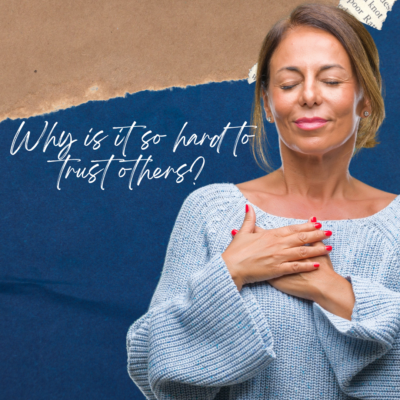Why is it so Hard to Trust Others?
“I-don’t-trust-people”. When I hear this statement in therapy, oftentimes there are ruptures in relationships. Maybe you have been let down multiple times, feeling emotional or physical abandonment. Maybe no one has been there to show up consistently to support you when you needed them most so now you depend on yourself (and trust no one). Maybe your relational history has been described as abusive, traumatic, or toxic.
It can be hard to share with others and get your hopes up, only to experience disappointment. At this point, you may assume that others will let you down. Your guard may be up, along with the wall that creates distance from getting close to others. Fear often shows up in relationships. For example, fear-of-intimacy which can make it difficult to be in close relationship.
While trust is built over time, here are ideas to help trust others:
Heal Attachment Wounds
Early childhood experiences and attachment injury, show up in relationships (especially couple’s therapy). Experiences that reinforce learning that your needs are not met, and that people cannot be trusted shape the way we engage with others into adulthood and impact intimate relationships. Working on attachment in individual or couple’s therapy is one way to begin healing attachment wounds.
Start Small in Safe Spaces
Identify others that you would like to form a closer relationship. Taking a small step such as asking for help is a great place to start. Acknowledging that you are struggling in a particular area and try asking for what you need. Identify individuals who can help with small steps towards building trust.
Get Grounded
Get grounded in routine to help regulate your emotions and be at your best physically and emotionally. Expand your daily routine at home to routine in the community. Try connecting with some of the same faces over time as a way to move towards how-trust-people-again. Consider setting down some roots.
Set Boundaries
It is important to consider the type of relationship that you are working on building trust within and setting appropriate boundaries. A person who has difficulties with trust often has rigid boundaries whereas someone described as overly trusting often has porous boundaries. Learning about the types of boundaries and situations in which these may be applied can help with setting healthy boundaries.
Go From Negative to Neutral
When the intentions of others may be questioned, one can assume the best, assume the worst, or start neutral. If it feels unrealistic or unsafe to assume the best, try going from negative to neutral.
Consider Opposite Action
If you have a history of mistrust or unhealthy relational dynamics, try identifying what you are feeling and focusing on the facts of the situation. When your emotions do not fit the facts or when acting on your emotions is not effective, one strategy to try is the emotional regulation skill, opposite-action.
Recognize Your Worth
You are worthy of having safe, trusting relationships to meet needs for love or connection. You have inherent value as a person.
Written By : Charlotte Johnson, MA, LPCC
We’re Here to help
Our wellness experts will be happy to take care of you. You can CLICK HERE to schedule an appointment now or call (612)223-8898.
Meet Clinicians
We’re united by our commitment to providing effective, relevant, and innovative mental health support at all stages of your journey. Click Here to find out more about who we are, where we come from, and how we live out CARE’s mission every day.
The professionals at CARE are actively collecting and creating resources to help with what you need. We’re Here for You.



